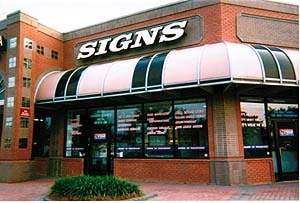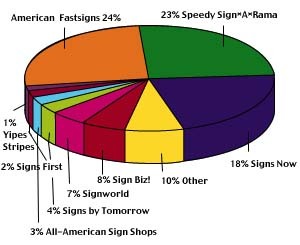Business Management
Franchisors and Licensors: A Round-Up
Prominent sign franchisors and licensors
Published
18 years agoon
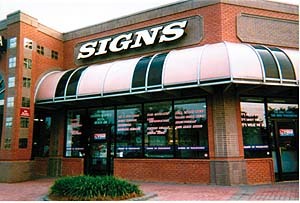
The mere mention of the word "franchise" is enough to make sign-industry purists cringe. But despite naysayers’ view of "the shops that vinyl built," these signshop chains have had a firm hold in the sign business since 1985, when Sign Stop, Mr. Sign and American Fastsigns first introduced the quick-sign concept. And although some franchisors have since dissolved, more have cropped up and continued to thrive.
ST‘s first coverage of franchise signshops was a bit hesitant. In our April 1989 issue, ST‘s Vice President/Publishing (then-Editor) Tod Swormstedt wrote, "We at ST realize we may be fanning the flames [in the suggested debate between proponents of CAD/CAM vs. proponents of the ‘craft’ of signs] by following through with this article. We also acknowledge we may be angering segments of our readership for even mentioning the words ‘franchise’ and ‘sign’ in the same breath." Indeed, many sign franchisees have sales and management, rather than sign-related experience. And some heads of franchise operations actually prefer franchisees with business backgrounds over those with actual signcraft experience.
However, some companies — such as Signs Now — take the opposite approach. As such, many Signs Now stores previously operated as independent signshops, but turned toward the franchisor for guidance and support in sales and marketing to improve profitability. Licensing companies provide similar services as franchisors, but require no additional royalty payments. Also, licensees choose individual names for their sign businesses. Sign Biz, an Irvine, CA-based licensor, says it invested in third-party marketing research that revealed most businesses seeking signage do not choose a signshop based on brand-name recognition, instead preferring to contract with local, custom signshops.
But whatever the case, the facts speak for themselves: Franchises and licensing companies are alive and well. In 1989, we reported seven known sign franchisors. In 1991, we listed 24 companies with more than 800 stores. Three years later, the number of franchisors dropped to 17, but the number of franchised stores increased to more than 900. In 1998, we find 13 sign franchisors, three licensors and one chain devoted to vehicle graphics, totaling at least 1,500 signshops in the United States and abroad.
In the following pages we take a look at some of the more prominent sign franchisors and licensors and how they work.
Who Shares the Sign Franchisor/Licensor Pie?
AdvertisementThe Franchisors
All-American Sign Shops Inc.
Raleigh, NC
(800) 966-2700
www.amerisign.com
This franchisor got its start in 1985 when a small-business owner in North Carolina became increasingly frustrated by the cost and time required to get simple signs for his fast-food-restaurant chain. Operating with a low-overhead, high-quality philosophy toward signage, the company had opened 18 stores at the time of our 1991 survey and now has 47 shops, most of which, according to CEO Gene Clontz, are east of Memphis.
Training begins with eight hours of home study to learn about sign-making materials and to complete 35 sign-making scenarios. Then, a representative takes the franchisee through nine days of hands-on training in computer software, operations, marketing, accounting and subcontracting. After training is completed, the franchisor helps research the area to find a good shop location. Once a location is selected, American Sign Shops helps the new store negotiate a lease. Using a pre-designed floor plan, the store set-up is outlined very specifically, with a counter, partition and floor coverings all provided and installed with the help of a franchise representative.
American Sign Shops also helps new stores design a unique marketing plan and provides a target account list to find clients. Additionally, the company offers advertising advice and promotional materials, even after the business is up and running. An on-line service provides corporate logos, clipart and font styles, as well as constant support.
Clontz estimates an initial cost between $66,000 and $93,000 to open a new store. Included in this estimate is the $20,000 franchise fee, as well as the cost of equipment, inventory, fixtures and lease payment. The company indicates that some financial assistance is available. Additionally, the franchisor requires a royalty fee of 6 percent of gross sales, minus sales tax.
AdvertisementWhile the company requires that its franchisees purchase a plotter, no digital-printing equipment is necessary. However, Clontz says that All-American Sign Shops is moving more toward digital printing and indicated that approximately 30 percent of the franchisees currently have digital-printing capabilities. Operating on an "aggressive-growth program," Clontz hopes to open 15 more franchisees next year, and to continue expanding at a rate of 12-20 new stores a year.
American Fastsigns Inc.
Carrollton, TX
(800) 827-7446
www.fastsigns.com
Fastsigns’ 12 years in the franchise-sign business have been stellar. With 411 franchisees in 41 states and eight countries, and more stores under construction, the company currently leads the pack in sheer number of stores. And with an extensive list of accolades in prominent magazines such as Franchise Times, Success and Entrepreneur, American Fastsigns certainly seems to have the recipe for success.
One secret is in the name. Fastsigns offers signs — fast. And in a society that increasingly requires a quick turnaround, this company delivers the goods. Specifically, the business produces a primarily vinyl product using computer-aided sign-making (CAS) software and equipment, a plotter and often, a small-format digital printer. Although the company’s primary product is vinyl signage, stores do subcontract out other signage needs, such as electrical signs and installations.
Before opening a store, franchisees undergo some serious preparation, which involves a three-week training course on sign-making, marketing and managing. Additionally, franchisees learn how to analyze store performance; effectively hire a staff; and how to train, motivate and compensate their employees. As part of its support, Fastsigns also offers marketing materials and promotional items.
According to Fastsigns literature, store layout is the heart of the franchise signshop. In fact, the company has exact requirements for its store layouts — with displays and information packaged into a kind of "store in a box." In addition to sending out a site-selection expert to help choose a location, Fastsigns outlines some basic store elements, such as a glass-walled showroom for customers to observe the sign-making process; a bright, clean look to indicate professionalism; and ready-to-assemble production tables, countertops and display boards. Also, the company’s affiliations with other national businesses translate to some immediate sales opportunities, and its relationships with vendors afford substantial discounts on materials.
AdvertisementTo open a store, Fastsigns necessitates a working capital of $40,000 and estimates a minimum total cost of $110,000. Specifically, this includes: a $20,000 franchise fee; an estimated $43,468 for leaseholds, fixtures, deposits, permits and insurance; $37,535 for equipment, inventory, tools and supplies; and $9,089 for training, advertising and professional fees. Additionally, Fastsigns requires a royalty fee of 6 percent of gross sales, minus sales tax, and an advertising fee of 2 percent of gross sales, minus sales tax.
According to ST’s 1997 Vinyl Shop Survey, the six Fastsigns franchisees that responded to the survey indicated an average cost of $116,500 to open a store, and an average annual sales volume of $448,475. These six respondents had stores that were, on average, five years old.
Signs by Tomorrow
Columbia, MD
(800) 336-4610
Signs by Tomorrow emphasizes careful selection of its franchisees. According to Franchise Director Bob Nunn, this company "doesn’t want to franchise just to franchise." As such, he looks for people with a positive, outgoing personality and a customer-service philosophy. He says, "We practice customer service almost like a religion."
With the purported "most extensive training in the industry," Signs by Tomorrow franchisees start with a two-day orientation when they sign up, followed by two weeks of basic training at the Maryland headquarters. Training involves sales, marketing, administration and sign-making courses. Once the store is open, a field representative stays with the new franchisee for the first two weeks. After that, ongoing support includes periodic training visits, regional meetings, annual conventions, a toll-free service number, marketing materials, supply discounts and newsletters.
The cost to open a Signs by Tomorrow franchise is estimated at between $90,000 and $120,000. The cost includes a $19,500 franchise fee, plus supplies, tools, equipment, store lease, etc. Additionally, the company requires a 5-percent royalty fee for most sign work, and a 2 1/2-percent royalty fee for subcontracted work. If a store grosses more than $40,000 a month, the franchisor drops the royalty to 2 1/2 percent of gross sales.
Thus far, the franchisor has 77 stores in 23 U.S. states, the first of which was opened in 1988 by Company President Joe McGuiness. Nunn says Signs by Tomorrow is technologically aggressive, however, it doesn’t recommend that new franchisees invest in a digital printer initially. He says it’s important for a new shop to first learn the ropes of hands-on sign-making before going digital.
Signs First
Memphis, TN
(800) 852-2163
e-mail: smonotagco@aol.com
Founder James Warr opened his own sign business in 1966, getting involved in screen printing, electric-sign building, sign maintenance, plastic molding and CAS development. In 1978, he incorporated the business as Monotag Corp. Following the CAS trend, Warr decided to focus on supplying the needs of a niche market and developed prototype stores to meet the demand for quick sign-making. Thus, Signs First opened its first franchise in 1989.
Nine years later, the company has 37 franchisees in the United States. Company literature estimates an initial franchisee investment of $81,697. This figure includes the $15,000 franchise fee plus training, working capital ($14,000), inventory, advertising, leasehold improvements, lease, deposits, supplies, furniture, fixtures, and computer and equipment. The three-week training course covers: franchising support, sign-making basics, product lines, supply networking, sales and marketing, retail pricing, bookkeeping, personnel policies and procedures, computer and software operation, digital imaging and an equipment loaner program. The company also offers financing.
Signs Now
Bradenton, FL
(800) 356-3373
www.signsnow.com
Signs Now began in 1983 in Austin, TX, under the guidance of Mance Etheredge. In 1986, Murry Evans, a fast-food franchisee, bought the company and sold the first Signs Now franchise store that same year. Currently, Signs Now operates 312 signshops in 14 countries, which is a leap from the 114 stores the company listed in our 1991 franchise survey.
Because Signs Now puts a focus on converting independent shops to franchisees, the cost to open a store varies. The franchise fee is $19,800 for brand-new stores and $7,500 for converts. However, to get the convert rate, the shop must have been operating independently for two years with gross-annual sales of at least $100,000.
Total investment for a non-convert to open a franchise store ranges from $58,520 to $315,850. This wide range is based on the company’s four different systems of operation — from opening a franchise with basic equipment, such as a plotter and related software, to opening a store with large-format, electrostatic digital printers. Signs Now also recommends having working capital when opening a store.
New franchisees with no sign-industry experience receive four weeks of training, which includes three weeks of training in an existing franchise store, and one week of training once the store is open — all under the guidance of a regional manager. Converts receive two weeks of training. During this time, franchisees hone skills in computer-aided sign-making, lettering, sign layout and design, management, sales, pricing and marketing. Because Signs Now puts emphasis on digitally printed signage, franchisees are encouraged to invest in a GERBER EDGE.® thermal-transfer printer. If a shop proves successful in this end and can finance additional equipment, it is encouraged to purchase a large-format digital printer.
Like other franchisors, store layout is uniform from store to store. Regional managers help franchisees narrow down a location, but leave the final decision up to the individual. Then, the company looks over the lease to ensure the franchisee negotiates the best deal. Although no exclusive territories are given, Signs Now will first contact an existing franchisee to see if a prospective store will interfere with business in the same area.
According to Allan Dygert, who is involved in franchise sales, Signs Now treats its franchisees as valuable customers. As such, ongoing support for franchisees is extensive, and includes support from the 20 regional managers, 40 regional meetings a year and one annual national meeting with seminars and workshops. Additionally, Signs Now offers an extensive Web site with private access for its franchisees, and sets up Web pages for each store. The company also publishes a monthly newsletter, offers discounts with suppliers, creates marketing materials and has 24 toll-free support numbers.
Speedy Sign*A*Rama USA Inc.
Palm Beach Gardens, FL
(800) 286-8671
www.sign-a-rama.com
The first Speedy Sign*A*Rama® franchise opened in 1986 under the tutelage of Ray Titus and his father, Roy. After carefully researching many different businesses and industries, the duo decided the sign industry offered a great opportunity to use their skills in graphic arts, marketing and sales. The company’s idea of automated graphics led to the opening of its first store in Farmingdale, NY, in 1987. In 1991, the franchisor had more than 130 stores and expected to open an additional 50-70 new stores the same year. Today, Sign*A*Rama has 393 franchisees in 15 countries, including the United States, and expects to reach 500 by the end of 1999.
This franchisor’s focus is on creating a full-service sign franchise able to produce illuminated and non-illuminated signage, including neon, carved and engraved signage, banners and vehicle graphics. As part of its package, Sign*A*Rama offers practical, on-the-job training. Its classroom training takes place over a two-week period in Florida, and airfare, transportation to and from school and daily lunch are included in the initial costs. Training continues with a local field representative who helps franchisees set up the equipment, and a marketing representative who shows how to market and promote the business.
The cost to open a Sign*A*Rama franchise is $95,000-98,000. Part of the estimate is the $37,500 franchise fee — which includes store renovations, furnishings, site selection and lease help — and the remaining investment costs are for materials and equipment. Sign*A*Rama also requires a royalty fee of 6 percent of gross sales, minus tax.
As part of its ongoing support, the company offers toll-free support numbers, training videos, a newsletter, an Internet site, local seminars and regional meetings. Additionally, 15 regional offices provide continued guidance and support for all franchisees.
Like other franchisors, the shop-layout is fairly uniform from store to store, with a neat, organized lobby and front counter area, as well as a computerized pricing system provided by Sign*A*Rama. The production equipment is designed to support various sign-making materials in a range of shapes and sizes. But before opening a franchise, each owner has to have an exact location, lease and marketing area before making a commitment with the company.
According to Vice President William Luce, the franchisor’s focus is not on having the highest number of franchisees, but on making its stores highly profitable. He adds that most Sign*A*Rama owners hail from sales or management backgrounds, and few have previous experience in the sign industry.
Yipes Stripes™
Dover, DE
(800) 947-3755
Although Yipes Stripes was founded by David Robbins 22 years ago, the first franchisee opened in 1988. Currently, Yipes Stripes has 20 franchisees, mostly in the midwest and on the east coast. Unlike the other franchisors listed, however, Yipes Stripes is geared specifically toward custom pinstriping and painting on vehicles, rather than signage. The franchisor bases its operation on the Yipes Stripes Perma-Stripe System™ — a paint formulation that reportedly lasts for the life of the vehicle. Yipes Stripes literature says the product dries instantly.
The company offers a two-week training course at its Yipes Stripes University in Dover, DE. The training includes learning Perma-Stripe application techniques; marketing concepts; how to attract new accounts; and bookkeeping methods. The $40,000 cost to open a Yipes Stripes franchise includes a $25,000 franchise fee for a minimum 50 new-car-dealership territory, and $15,000 for training, equipment and inventory. Thereafter, the franchisor requires a 5-percent (of gross sales) royalty fee, or a minimum of $500 a month. Continued support comes in the form of a quarterly newsletter, a toll-free support number, and annual meetings and training sessions.
According to the literature, most franchisees work from their homes, thereby minimizing overhead costs. Company President Diane Scinto says Yipes Stripes likes its franchisees to start out as a mobile unit. And she estimates most franchisees open a retail center after about five years in business. Scinto also notes that the company is not aggressively expanding its franchise, but is currently working on strengthening the existing businesses.
The Licensors Licensors, like franchisors, help new signshops open their doors by offering training, marketing help and continued support through their headquarters and network of signshops. Unlike franchisees, however, licensees do not assume the licensor’s name, nor do they pay a royalty fee based on gross sales.
In fact, if you speak with a licensor, you find they really don’t want you to confuse them with franchisors. The following licensors — also called business opportunities — currently offer training and support for new signshops.
Sign Biz! Inc.
Irvine, CA
(800) 633-5580
www.signbiz.com
When we surveyed franchisors and licensors in 1991, Sign Biz! had been open just two years and listed eight network stores in five states. Now, with 143 network members in the United States, Canada, Mexico, the Phillipines, Bahamas, Newfoundland and Mongolia, the 11-year-old Sign Biz! continues to help its members open — and sustain — successful computer-aided sign-making businesses.
According to President and CEO Teresa Young, who previously owned her own sign business for six years, the company has invested in market research that indicates business people do not choose sign businesses based on brand recognition, but tend to prefer a local, custom-sign company over a "cookie-cutter" sign business. As such, she says, Sign Biz! members gain the support of being part of a larger company, but run signshops under individual names with individual specialties, without paying royalties.
The company’s literature estimates a $92,500 investment to open a store as a Sign Biz licensee. This initial cost includes: $16,750 for a protected territory and membership rights; $34,355 for equipment, inventory, tools and manuals; $12,320 in training expenses and professional fees; $5,500 for a two-year coaching program; $3,575 for an identity package; and $20,000 for leaseholds, fixtures, deposits, permits and insurance. Sign Biz! also recommends its licensees have $25,000 working capital when opening a shop.
As part of its "Turnkey Package," Sign Biz! offers marketing assistance; entrance into an international co-operative-advertising program; comprehensive training in computer-aided sign-making — which includes one week of home instruction, 40 hours in a corporate classroom and 40 hours practical experience in a signshop; and continuing education programs, such as regional workshops and an annual convention.
According to Sign Biz! literature, five of its network licensees currently gross $1 million or more, and 20 licensees gross more than $500,000 annually.
Signworld
Kona, HI
(800) 545-2777
Based in Kona, HI, and in business since 1988, Signworld now has 120 licensees worldwide. According to President Ken Kindt, the company aims for controlled growth rather than an aggressive-growth track, but hopes to add 80 licensees within the next four years.
Signworld helps its licensees by offering a full computerized system, which includes software, hardware and a plotter. As part of an approximate $65,000 initial investment, licensees also receive training, which includes a four-day technical program on the computer system’s hardware and software; a three-day course on sign design and layout, advertising, marketing, employment, sales, supplies, pricing, accounting, insurance and daily operation; and three days of hands-on training at a Signworld affiliate shop. The initial fee also includes supplies to get the new signshop started. However, the company recommends new shop owners have an additional $20,000 of working capital.
A professional site selector assists licensees in choosing the best location for a shop, then handles the lease negotiation. And, although the representative offers advice on the shop layout, the signshop’s name, logo design and shop design are ultimately left up to the licensee.
Signworld affiliates also receive a protected territory, which consists of approximately 3,000 businesses not to be targeted by other Signworld licensees. Additionally, the company offers three toll-free lines to answer questions, and a monthly newsletter with articles on the sign business and updates on other licensees.
According to the literature, most Signworld businesses are run by two to three people, which helps keep overhead to a minimum. And for most licensees, 90 percent of the income derives from a small group of approximately 50 clients.
ASI Sign Systems
Dallas
(800) ASI-SPEC
Main Event Lawn Sign Inc.
Arlington Heights, IL
(847) 670-7777
Outdoor Fun Signs
Conestoga, PA
(717) 872-6916
Sign It Quick Intl. Inc.
Charleston, SC
(803) 763-3155
Sign Master Training (a licensor)
Mt. Vernon, OH
(800) 655-3620
Signs and More in 24
Parkersburg, WV
(800) 358-2358
Vac Set Sign Shop
Norton, KS
(913) 877-3816
Yard Cards®
Teays, WV
(304) 757-6944

SPONSORED VIDEO
Introducing the Sign Industry Podcast
The Sign Industry Podcast is a platform for every sign person out there — from the old-timers who bent neon and hand-lettered boats to those venturing into new technologies — we want to get their stories out for everyone to hear. Come join us and listen to stories, learn tricks or techniques, and get insights of what’s to come. We are the world’s second oldest profession. The folks who started the world’s oldest profession needed a sign.
You may like

INX Promotes Three to Vice President

6 Sports Venue Signs Deserving a Standing Ovation

Hiring Practices and Roles for Women in Sign Companies
Subscribe

Bulletins
Get the most important news and business ideas from Signs of the Times magazine's news bulletin.
Most Popular
-

 Tip Sheet4 days ago
Tip Sheet4 days agoAlways Brand Yourself and Wear Fewer Hats — Two of April’s Sign Tips
-

 Business Management2 weeks ago
Business Management2 weeks agoWhen Should Sign Companies Hire Salespeople or Fire Customers?
-
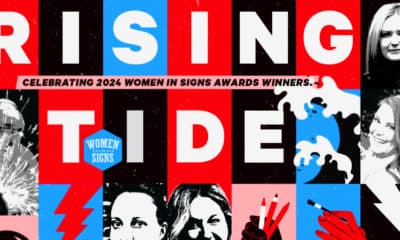
 Women in Signs2 weeks ago
Women in Signs2 weeks ago2024 Women in Signs Award Winners Excel in Diverse Roles
-

 Real Deal5 days ago
Real Deal5 days agoA Woman Sign Company Owner Confronts a Sexist Wholesaler
-
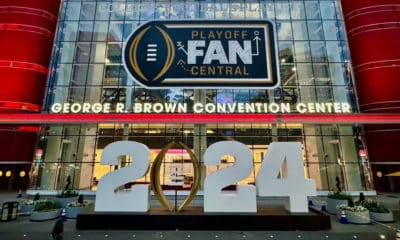
 Benchmarks22 hours ago
Benchmarks22 hours ago6 Sports Venue Signs Deserving a Standing Ovation
-
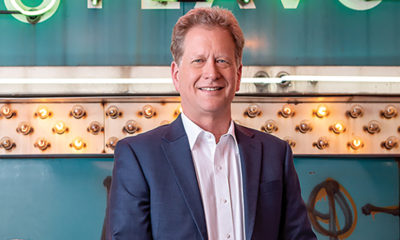
 Editor's Note1 week ago
Editor's Note1 week agoWhy We Still Need the Women in Signs Award
-

 Line Time2 weeks ago
Line Time2 weeks agoOne Less Thing to Do for Sign Customers
-
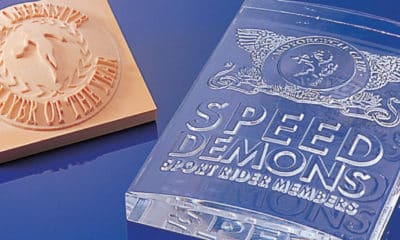
 Product Buying + Technology1 week ago
Product Buying + Technology1 week agoADA Signs and More Uses for Engraving Machines
